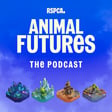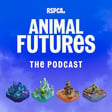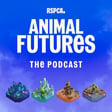
Episode 1 - Volunteering, changing laws and wildlife walks with Geoff Edmond
Welcome to Walk on the Wild Side, an RSPCA podcast. We’ll meet people from this 200-year-old animal welfare charity, and learn about what they do. We’ll discover more about the amazing wildlife all around us, and how we can help it thrive, and be inspired to get outdoors and into nature.
In this episode, Holly Cushen goes for a walk in the fields around RSPCA Newbrook Farm with Lead Wildlife Officer Geoff Edmond. Wildlife is all around us – we don’t own it but we have to look after it, and we can help by creating wildlife corridors, putting out food, being careful with our litter and volunteering as an RSPCA Wildlife Friend. In return, walking in nature can make us happy – and children especially love minibeasts! Holly and Geoff also talk about the RSPCA’s long history of collaboration: with governments to change and create laws; other organisations to improve animal welfare day to day; and the public – for instance after the Torrey Canyon oil spill in 1967 when the RSPCA and local communities came together to help birds.
Host: Holly Cushen
Writers: Holly Cushen and Morwenna Kearns
Producer: Morwenna Kearns
Audio producer: Chris Attaway
Wildlife advisor: Rebecca Machin
Executive producer: Sarah Millerick
Recorded on location at RSPCA Newbrook Farm in Birmingham
Wildlife advice: rspca.org.uk/adviceandwelfare/wildlife
Work for the RSPCA: jobs.rspca.org.uk/jobs/home
Volunteer for animals: rspca.org.uk/getinvolved/volunteer
More information on how to get involved: rspca.org.uk/getinvolved/donate/audio



